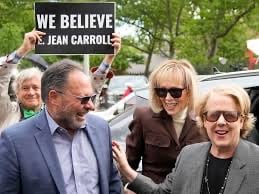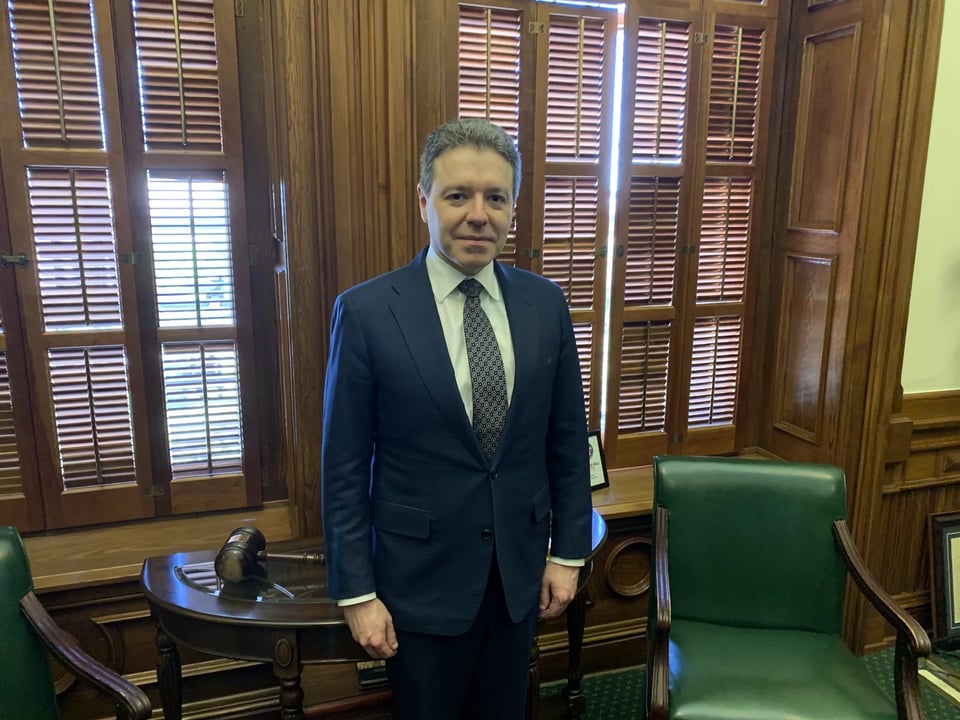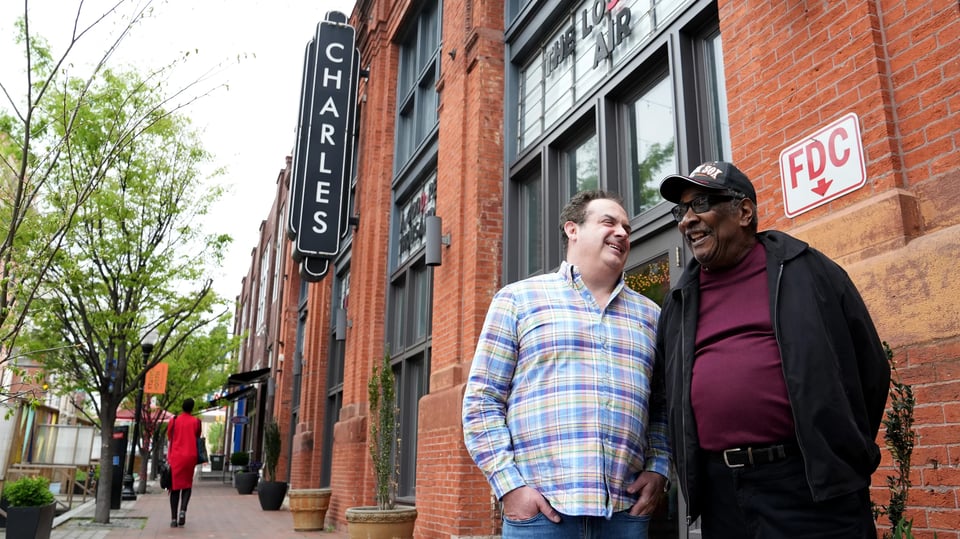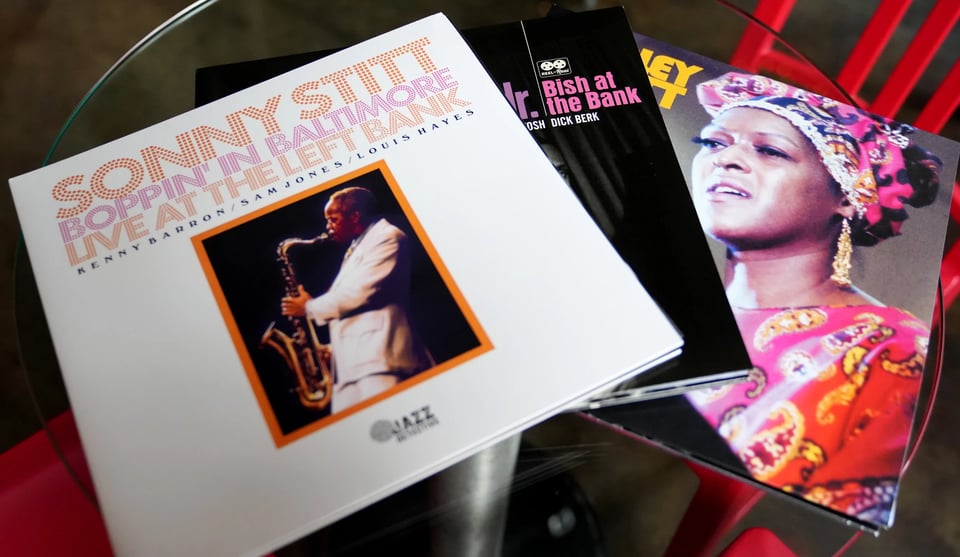Wednesday, May 10, 2023. Annette’s News Roundup.
I think the Roundup makes people feel not so alone.
To read an article excerpted in this Roundup, click on its blue title. Each “blue” article is hyperlinked so you can read the whole article.
Please feel free to share.
Invite at least one other person to subscribe today! buttondown.email/AnnettesNewsRoundup
_______________________________
Trump loses. Liable for sexual battery. Liable for defamation.
Owes $5 million.
E. Jean Carroll and the women of the trial — the friends she told, the other victims who came forth - may have saved our Democracy. And yes, Robbie Kaplan who is a legal giant… the Windsor case that felled the Defense Against Marriage Act - and Trump.
A unanimous jury. 6 men. 3 women. 3 hours.
To quote Robbie’s words outside the court, “We are very happy.”

The litany of legal cases against Donald Trump continues - first, 36 felony counts, now this, then will come Georgia and interference with the 2020 election or will it be Jack Smith and charges with regard to January 6th, or perhaps the Mar-A-Lago classified document case?
How many of the at least 26 women who have accused Trump of sexual misconduct or assault will now come forward?
Will the Republicans continue as Team Extreme? Will they continue to choose politics over people? Will they risk votes from suburban and other women?
One more thing.

Trump’s team is out with a lengthy document responding to the Carroll verdict, starting with a statement from a Trump spox: pic.twitter.com/1R0tuCMP4t
— Shelby Talcott (@ShelbyTalcott) May 9, 2023
Remember - E. Jean Carroll first publicly accused Trump in 2019, during his presidency, before he was running for the 2024 Election.
Andrew Weissman, lead prosecutor in Robert S. Mueller's Special Counsel's Office and Chief of the Fraud Section in the Department of Justice said that the Carroll case is so solid, so grounded in fact, and issued under a court case under a much respected Federal Judge Lewis Kaplan. Weissman said therefore it won’t succeed under appeal, if an appeal ever occurs.
E. Jean Carroll’s statements after the verdict in her favor.
E. Jean Carroll statement: "I filed this lawsuit against Donald Trump to clear my name and to get my life back. Today, the world finally knows the truth. This victory is not just for me but for every woman who has suffered because she was not believed."
— Kyle Griffin (@kylegriffin1) May 9, 2023
STATEMENT FROM E JEAN: "I would like to express my deep and lasting gratitude to all those who have stood by me from the start, especially my incredible and fearless legal team, led by Robbie Kaplan, who never, ever backed down in pursuit of truth and justice."
— Mueller, She Wrote (@MuellerSheWrote) May 9, 2023
E. Jean Carroll’s Lawyer Robbie Kaplan’s statement after the verdict.
“No one is above the law, not even a former President of the United States. For far too long, survivors of sexual assault faced a wall of doubt and intimidation. We hope and believe today’s verdict will be an important step in tearing that wall down. This is a victory not only for E. Jean Carroll, but for democracy itself, and for all survivors everywhere.”

This article 👇 from Slate makes clear the background against which the verdict against Trump was reached.
“Not My Type”
Donald Trump’s astonishing deposition in the E. Jean Carroll trial pretty much says it all.
It views like a defense attorney’s worst nightmare. In the video of Donald Trump’s October 2022 deposition for the E. Jean Carroll trial, he comes off like a petty, resentful liar, making a series of unforced errors so blatant it almost seems he is trying to lose his case.
The video was Trump’s only appearance in the civil trial in which he stands accused of raping and defaming Carroll; his last opportunity to register his intent to take the stand expired on Sunday. The jury heard closing arguments on Monday and will now deliberate on a verdict.
Watching clips from the deposition, which Carroll’s attorneys played for the jury last week, it’s easy to see why Trump and his legal team decided to keep him off the stand. His performance suggests he is incapable of even pretending to go through the motions of a humble, respectful round of questioning with a female attorney, much less convince a jury that he is not the kind of guy who would rape someone in a department store dressing room.
In one clip, Trump is confronted with the 2005 Access Hollywood tape—another piece of evidence that was presented to the jury—in which he contended, on a hot mic, “when you’re a star, they let you do it.” (It, you may recall, is kissing women without seeking their permission and grabbing them “by the pussy.”)
“Well, historically, that’s true with stars,” Trump responds in the deposition.
“It’s true you can grab them by the pussy?” Carroll’s lawyer, the prominent women’s rights attorney Roberta Kaplan, asks.
Trump replies, “Well, that’s what—if you look over the last million years, I guess that’s been largely true. Not always, but largely true. Unfortunately, or fortunately.”
It is hard to decide which part of Trump’s self-defense is more absurd and less self-exonerating: the part where he suggests that he was merely explaining to Billy Bush the regrettable history of men using their fame to sexually abuse and exploit women, or the part where he suggests that such abuse may be fortunate. Fortunate! Neither part quite makes Trump seem like a credible defendant who disapproves of sexual assault.
Elsewhere in the deposition tape, Trump answers a question from Kaplan about his claim that Jessica Leeds, who testified last week that Trump forcibly kissed and groped her on an airplane in the 1970s, “would not be my first choice” to “go after.”Then, unprompted, Trump goes on to assess Kaplan’s sexual desirability. “You wouldn’t be a choice of mine either, to be honest with you. I hope you’re not insulted,” he said.
He went on, “I wouldn’t, in any circumstances, have any interest in you.”
This is the former president up to all his old tricks: low-key glorifying sexual assault, attempting to demean a woman wielding power in his vicinity by delivering a sexist, sexualizing insult. None of it should surprise anyone who has paid attention to Trump’s conduct over the course of his life. But somehow, his inability to change his behavior even a little bit to protect himself from a damaging jury verdict suggests new levels of impulse non-control. He simply had to refrain from mocking a woman’s appearance for the duration of one single deposition, which is occurring because another woman has accused him of rape—and he couldn’t. Or he couldn’t fathom the possibility that he might experience a consequence of his actions.
These two moments in the deposition came during responses to subjective questions. Trump’s deportment in them could be judged by the jury as disrespectful, crude, untrustworthy, and misogynistic—all factors that could work against him as jurors strive to decide whether it is Trump or Carroll who’s lying about the alleged rape.
But a third astonishing moment of the deposition makes a factual point that could clinch the defamation charge.
“That’s Marla, yeah. It’s my wife,” Trump says in the video, pointing to a photo taken in the 1980s. He is pointing to a woman who is depicted chatting with him in a group that includes his then-wife Ivana and Carroll’s then-husband John Johnson. The woman he is pointing to—while calling her his wife—is Carroll herself. Trump realizes that he has mistaken his accuser for his ex-wife Marla Maples only when his lawyer corrects him.
You can almost hear Kaplan’s glee as she confirms what Trump said. To prove that Trump has defamed Carroll, her legal team must prove that he was lying when he made the statements that allegedly damaged her reputation. One of those statements was that Carroll was, according to Trump, “not my type,” and thus unlikely to have been a target of his sexual interest. By confusing Carroll for Maples—who was demonstrably Trump’s “type,” because she was his wife—Trump seems to have proved his own statement false.
The deposition wasn’t the first time Trump saw that photo. Carroll’s team is also using it to prove that the two had met before the alleged assault and recognized each other when their paths crossed at the department store. (Trump denies that he would have recognized Carroll.) In the deposition video, Trump even says that he has seen the photo before, “at some point during the process,” presumably meaning the progression of Carroll’s suit. It is next to impossible that his lawyers would not have prepared him to answer questions about a photo that would likely be introduced as evidence in the case.
So, why did he say that Carroll was Maples, possibly spoiling his own defamation defense? Perhaps he forgot that he was supposed to say he didn’t know who it was and, because he can’t stop talking, blurted out another blond woman’s name as a way of implying that they all look the same to him. Or maybe he remembered that one of his wives (Ivana) was in the photo, but forgot which wife it was and which person in the photo she was supposed to be. Maybe he just lacks the discipline to properly carry out a legal strategy. Whatever it was, he should be glad he wasn’t called to the stand to misidentify his ex-wife in person. (Slate).
here's a clip from Trump's deposition where he comments on the Access Hollywood tape pic.twitter.com/HxrPtH0UYa
— Aaron Rupar (@atrupar) May 5, 2023
A rush of E. Jean Carroll v. Donald Trump exhibits have been released — including the former president's video deposition.
— Adam Klasfeld (@KlasfeldReports) May 5, 2023
Here's an excerpt where Trump mistakes Carroll with his ex-wife Marla Maples.
Background, @LawCrimeNews: https://t.co/SqzCH2RjpY pic.twitter.com/IIkbCBGCNL
________________________________
Former Representative Liz Cheney’s PAC begins its ad against Trump.
Former GOP Rep. Liz Cheney’s PAC launched a new TV ad in New Hampshire ahead of CNN’s scheduled town hall with former President Donald Trump arguing he is “unfit for office” and is “a risk America can never take again.”
Touch to start. 👇
________________________________
Joe is always busy.
Biden calls for 'fair deal' for striking Hollywood writers.
 The President with actor Ke Huy Quan.
The President with actor Ke Huy Quan.
WASHINGTON (AP) — President Joe Biden called for a “fair deal” for Hollywood’s striking writers on Monday as he hosted a White House screening of the the upcoming streaming series “American Born Chinese” to mark Asian American, Native Hawaiian, and Pacific Islander Heritage Month.
Biden made his first public comments on the strike, which hits the one-week mark Tuesday, in remarks ahead of the pilot’s screening. He was joined by an overflow crowd of hundreds of community leaders, elected officials and cast members and producers from the show in the East Room and the State Dining Room.
“Nights like these are a reminder of stories and the importance of treating storytellers with the dignity, respect and the value they deserve,” Biden said. “I sincerely hope the writers strike in Hollywood gets resolved and the writers are given a fair deal they deserve as soon as possible.”
He added: “This is an iconic, meaningful American industry. And we need the writers and all the workers and everyone involved to tell the stories of our nation and the stories of all of us.” (Associated Press).
________________________________
Kamala is always busy.
Unless you clicked on this link yesterday, you may have missed what Gen Z thinks about the VP.

In what could have broad implications for the 2024 election, a new poll found that the nation’s youngest voters overwhelmingly support Vice President Kamala Harris.
The Economist/YouGov.com poll was conducted between April 29 and May 2 and surveyed 1,500 adults.
Among them were voters aged 18-29 years old — also known as Generation Z — who expressed their approval of Harris in no uncertain terms and had extreme faith in her ability to be president.
When it comes to approving of Harris’ job performance, 60% of the Gen Z voters polled indicated they either somewhat approve or strongly approve of her as vice president. Aside from Black voters as a whole, those were by far the strongest approval numbers for Harris of any demographic surveyed.
When asked whether Harris qualified to be president, 52% of the Gen Z voters responded in the affirmative. That’s second only to Black voters’ 58%.
When it came to the topic of whether Gen Z voters think Harris is honest and trustworthy, 52% of the young respondents said yes. That’s in comparison to 61% of Black voters responding the same way.
Finally, on likeability, 51% of the Gen Z voters surveyed responded in the affirmative regardless of whether they are with her politics. Sixty percent of Black voters responded similarly.
Harris’ approval matters because Republicans have been suggesting the morbid idea that President Joe Biden’s age (he’s 80 years old) increases the chances of him not being able to fully serve another term should he be reelected. Those politics of fear have been employed by conservatives like Republican presidential candidate Nikki Haley in an effort to scare people at the prospects of Harris, 58, becoming president, an ascension that would make her the first woman and Black woman commander-in-chief.
“If you vote for Joe Biden, you really are counting on a President Harris,” Haley told Fox News during an interview last week. “Because the idea that he would make it until 86 years old” — the age Biden would be at the end of a second term — “is not something that I think is likely.”
One of the primary reasons why data shows Gen Zers are voting more for Democrats is because they support issues championed by liberals, such as gun control, abortion rights, climate change and LGBTQ issues, topics in which Republicans appear to be on the wrong side of history. (Newsone).
________________________________
Historian Heather Cox Richardson’s thoughts on how America became so divided.
From Letters from an American, May 9, 2023.
Beginning in the 1980s, Republican leaders found voters to support their “supply-side” economics, which cut taxes and regulations to concentrate wealth so investors could bolster growth, by turning their base against “liberals.”
Calling those who opposed their policies “socialists” out to rig the system to redistribute wealth to minorities and women, they began the process of forging a base that considered itself the only real Americans. That process continued over the decades as right-wing media reinforced the idea. Still, though, leaders focused on their economic policies, especially tax cuts, and emphasized culture wars primarily to turn out voters.
Trump turned that formula on its head, playing directly to the base. He offered its members the anti-Black, anti-immigrant, and antiabortion measures it craved, in exchange for utter commitment to his leadership. His drive for authoritarianism dovetailed with a religious movement to create a new ideology for the Republican Party, one that explicitly rejects democracy.
That argument, articulated most clearly by Hungarian prime minister Viktor Orbán, is that the secular principles of liberal democracy—equality before the law, free speech, freedom to go to church or not, academic inquiry, a free press, immigration, companies that can make decisions based on markets rather than morality—destroy virtue by tearing down the sexual and religious guardrails of traditional society. In order to bring that virtue back, right-wing thinkers argue, the government must defend religion and self-sacrifice (although it’s hard to miss that they’re looking for other people to make those sacrifices, not themselves).
Last week, on May 4 and 5, the Conservative Political Action Conference met in Budapest for the second time, and once again, Orbán delivered the keynote address. The theme was the uniting of the radical right across national boundaries. “Come back, Mr President,” Orbán said of Trump’s 2024 presidential bid. “Make America great again and bring us peace.” Orbán claimed his suppression of LGBTQ+ rights, academic freedom, and the media is a model for the world.
Plenty of the people there from the U.S. seemed to agree. “Hungary,” Representative Paul Gosar (R-AZ) said, “is a beacon.”
In a recorded message, Trump said conservatives were “freedom-loving patriots” who are “fighting against barbarians.” “We believe in tradition, the rule of law, freedom of speech and a God-given dignity of every human life. These are ideas that bind together our movement,” he said. He called for the audience to “stand together to defend our borders, our Judeo-Christian values, our identity and our way of life.”
While conference organizers were celebrating Hungary as the only truly free country in Europe, they were taking advantage of Hungary’s suppression of the media to permit only hand-picked journalists to cover the event. Failed Arizona gubernatorial candidate Kari Lake said that “truth-tellers and peacemakers” were being destroyed by “fake news,” as they call every journalist who criticizes them.
Jacob Heilbrunn of the National Interest was one of those barred from the conference. He watched from his hotel room and wrote in Politico, “Throughout, the idea was clear: Liberalism is synonymous with tyranny.”
________________________________
Meet a terrible person.
The name Leonard Leo has become familiar to me/us in recent days. He is the co-chair of the Board of the Federalist Society who recently claimed a $1.8 billion donation to fight against abortion rights, climate change legislation and more.
Then there is Harlan Crow, the billionaire all buddy-buddy with Justice Thomas, taking him on million dollar vacations, paying his wife hundreds of thousands of dollars, buying his childhood home from the judge, restyling it and allowing the judge’s mother to live in it rent-free, and paying tuition ($6,000 a month) for Thomas’s ward - while having at least one case before the high court.
Now meet Jonathan Mitchell.
Jonathan Mitchell devised a Texas abortion ban that relies on civil lawsuits.

In person, Jonathan Mitchell is polite and even soft-spoken. But he's also relentless — even when he knows he's about to exasperate a federal judge.
"Are you a Texan?" U.S. Magistrate Judge Mark Lane asked from the bench, on a recent morning in late April, after Mitchell's clients had failed to show up for a scheduled deposition. "What part of courteous lawyering is this?"
Mitchell was inside a federal courtroom in Austin for a discovery hearing in a book-banning case from tiny Llano, Texas. He is defending local officials who've been sued over the removal of public library books after conservative activists deemed them offensive. Local library patrons are challenging the removal on First Amendment grounds.
Judge Lane asked why Mitchell's clients hadn't shown up. Mitchell, who grew up in Pennsylvania and whose law firm is based in Austin, said he believed the other side hadn't followed all the rules, and he was simply acting in his clients' best interest by advising them not to appear.
Lane told Mitchell the whole thing had been a waste of the court's time, before adjourning the hearing.
An expert at finding legal loopholes
On matters large and small, Mitchell has become an expert at finding tiny openings in the law and leveraging them on behalf of his conservative clients and their causes.
A former Texas solicitor general, Mitchell said his legal work now focuses on helping conservative lawmakers draft legislation "in a way that will make them not only effective, but also able to withstand a court challenge if one arises." He also represents individuals and government entities involved in litigation like the library case.
Two days before the hearing in Austin, Mitchell had been the elephant not in the room during a public hearing in the small town of Edgewood, New Mexico. Residents spent hours debating a local anti-abortion ordinance he helped draft as part of a nationwide effort by a Texas-based group to pass local restrictions on abortion.
Before voting 4-to-1 to approve the proposal, Edgewood commissioners went behind closed doors to consult with Mitchell over Zoom about the legal risks they might face for doing so. The ordinance appears to directly contradict a New Mexico Supreme Court order and a new state law taking effect in June, both of which prohibit local municipalities from restricting abortion access.
In drafting the ordinance, which allows private citizens to sue each other to enforce the rules, Mitchell took a page from the playbook he used to help Texas lawmakers draft the now-famous near-total abortion ban, S.B. 8. That legislation — sometimes called the "bounty hunter law" — pioneered the idea of allowing private citizens to file lawsuits worth tens of thousands of dollars against anyone they suspect of being involved in abortion.
During the town commission meeting on April 25, Linda Burke was among many residents from Edgewood and beyond who lined up to speak.
"It's a little disconcerting to see our tiny little town become the center of this issue," Burke said. "It is a hot-button issue. I just really hate to see it turn neighbor against neighbor."
Asked about that concern, Mitchell said, it "depends on your view of abortion ... If you are opposed to abortion, if you think it should be outlawed and criminalized, then the question becomes, how do you have an effective prohibition on abortion?"
When Mitchell is asked for his own view on abortion, he is difficult to pin down.
"Very little of this has been my own philosophy of abortion that I'm trying to impose. All this has been done in the context of representing clients," he insists.
But, he acknowledged, "I wouldn't take cases if I thought that what I was doing was legally indefensible or grossly immoral."
Shaken faith in the nation's highest court
Mitchell, 46, is also guarded about his personal life and religious background. He studied at Wheaton College, often described as the nation's flagship evangelical undergraduate institution, before graduating from the University of Chicago Law School in 2001.
He is reserved about discussing his faith.
"It's very personal," Mitchell said. "I certainly am a churchgoer. It doesn't necessarily have to be a particular branch or an evangelical denomination, but we make those decisions and we do what's best for our family."
After law school, Mitchell clerked for a federal judge and then Supreme Court Justice Antonin Scalia, an experience that he said made him skeptical of the court as an institution.
"You sort of get to see how the sausage gets made when you're behind the scenes," Mitchell said. "The decision-making was more politicized and more results-oriented than I would have expected."
As a lawyer working with conservative activists and lawmakers, Mitchell has appeared laser-focused on getting results.
His former law professor, Richard Epstein, describes Mitchell as one of the brightest legal minds ever to sit in his classrooms over Epstein's more than five decades of teaching at the University of Chicago and NYU.
"He's kind of a technical magician," Epstein said. "You give him 10 cases and five statutes and all this stuff and he can figure out the way to cut through this mess better than virtually anybody else you could meet."
Mitchell employed that technical acumen when he worked with Republican State Sen. Bryan Hughes, who sponsored S.B. 8, to craft the bill. During an interview inside Hughes's office at the Austin statehouse, Mitchell said the two men had known each other for years, and had seen state legislatures around the country pass abortion bans only to have them struck down under Roe v. Wade.
"We were thinking a lot over the years about tactics to try to make our laws just more immune from court challenge," Mitchell said.
Mitchell thought letting private citizens file civil lawsuits could be a way to get around Roe. And in 2021, with three justices appointed by former President Donald Trump on the bench, the Supreme Court allowed S.B. 8 to take effect – to the surprise of some legal observers.
"It sort of came out like a bolt from the blue," Mitchell said. "I don't think people realized there were ways in which you could draft a statute that circumvents that entire process. It took a little bit of outside the box thinking."
Complex theories with real-world impact
But for many patients in Texas who wanted and could no longer get abortions, S.B. 8 has forced difficult and sometimes dangerous choices.
Anna Zargarian is among a group of Texas women who were denied abortions for medical emergencies and are now suing the state. She spoke during a March press conference announcing the lawsuitoutside the statehouse in Austin.
"I begged my doctors to give me the care I needed. They said they wanted to help but couldn't under Texas law," she said. "Where else in medicine do we do nothing and just wait and see how sick a patient becomes before acting?"
In December 2021, just months after S.B. 8 took effect, Zargarian says she went into labor around 19 weeks, too early for the pregnancy to survive. On the advice of her doctors, she traveled to Colorado for an emergency abortion that doctors recommended but said they could not provide under the law.
Asked about that case, Mitchell expressed surprise that the law he helped draft would be interpreted to prohibit medically-necessary abortions.
"It concerns me, yeah, because the statute was never intended to restrict access to medically-necessary abortions," he said. "The statute was written to draw a clear distinction between abortions that are medically necessary and abortions that are purely elective. Only the purely elective abortions are unlawful under S.B. 8."
Whatever Mitchell may have intended, the impact of S.B. 8 and other abortion laws in Texas has been to shut down virtually all abortions in the state. Doctors say the laws are too vague and they fear lawsuits or prosecution.
From fringe to the mainstream
As the CEO of Whole Woman's Health, which used to provide abortions in Texas, Amy Hagstrom Miller has followed Mitchell's career closely, including his time as Texas solicitor general and his work with state lawmakers.
Her organization has sued the state "no less than 11 times in the 20 years that we were operational in Texas," she said. "So we have had quite a bit of back and forth over the years."
Whole Woman's Health unsuccessfully challenged S.B. 8 in court in 2021.
"My experience with [Mitchell] is that he has a very driven strategy to ban abortion by any means necessary," she said. "Oftentimes he's described as being very radical, very extreme and kind of fringe. Yet at the same point, he has kind of [become] mainstream."
More recently, Miller noted, Mitchell has been working to "dust off the Comstock Act," a largely forgotten anti-obscenity law from 1873 that prohibits transporting abortion-related materials across state lines.
Mitchell thinks it could be used to ban abortion nationwide. He's cited Comstock in anti-abortion ordinances in New Mexico and Illinois, and he hopes court challenges to those ordinances will provoke the U.S. Supreme Court to weigh in on whether the law still applies to mailing abortion pills, or any other medical supplies related to abortion.
"Now that Roe's been overruled, the Comstock Law can be enforced as written," Mitchell said. "The Biden administration is choosing not to enforce it, which is their prerogative, but a future Republican administration might."
Attorneys for anti-abortion groups have made a similar argument based on Comstock in an ongoing federal court case challenging access to the abortion pill mifepristone. Mitchell also cites it in a lawsuit filed on behalf of a Texas man who's accusing three women of helping his ex-wife obtain abortion pills to terminate her pregnancy.
Mitchell acknowledged that Comstock is "exceedingly broad" and would restrict abortion even more deeply than most abortion-rights opponents would like. It includes no exceptions for medical emergencies, and punishments include prison time. But Mitchell said Congress, not the courts, should amend the statute.
"If you don't like it, change it," he said. "And you can change it."
Winning in court, but losing elsewhere?
But Mitchell's approach could carry political risks for his ideological allies, said Mary Ziegler, a law professor at the University of California, Davis who has written about Mitchell's Comstock strategy.
"It's the chess match in the courts: 'What can I get the courts to sign off on?'" Ziegler said. "He's not concerned about whether voters hate it or it will backfire on the [anti-abortion] movement later."
Polls indicate a majority of American voters generally support abortion rights, and that support has grown in the months since Roewas overturned.
But Mitchell said his primary concern is winning for his clients.
"The politics are things I can't really control," he said. "I let them take care of themselves."
And some of his ideological rivals are taking note of his strategies and inverting them — what Epstein, his former law professor, describes as "reverse engineering."
So far, abortion rights advocates in Delaware and New Mexico have passed abortion protections that include enforcement using private rights of action. And in California, lawmakers passed a gun-control measure last year that relies on a similar mechanism modeled after
"If he can do it in Texas, Gov. [Gavin] Newsom can do it with something else, with climate change or something else, in the state of California," Epstein said. "So I'm not in favor of it — and I told Jonathan that."
Mitchell's ideas could have other consequences.
Under New Mexico's new law, the town of Edgewood could face expensive lawsuits for passing its anti-abortion ordinance. Mitchell has promised to defend Edgewood — and any municipality that adopts one of his ordinances — at no cost.
He would not say who's paying him for that legal work, only that it wouldn't be the taxpayers. (NPR).
One more thing. An article by DAHLIA LITHWICK to flesh out our knowledge of Clarence Thomas’s billionaire benefactor,Harlan Crow.
Clarence Thomas tuition: Why the latest revelation is the most insulting of all.
In 1969, Justice Abe Fortas resigned his seat at the Supreme Court for accepting $15,000 in exchange for a series of paid lectures at American University. Part of the Fortas scandal also involved news of him accepting a stipend for doing legal work for a very rich friend (money he had actually returned when the benefactor was indicted and before the outcry).
None of Fortas’ colleagues defended him for this. No one blamed the press or even the Nixon administration (which very much orchestrated the ouster). It was widely understood that Fortas had done something that undermined the public legitimacy and independence of the court and that he had to go.
Over the past few weeks we have learned that Justice Clarence Thomas took multiple luxury vacations, valued in millions of dollars, over many years, paid for by Harlan Crow, a billionaire GOP donor who has business before the court. We know that Crow had also contributed the $500,000 seed money that became Ginni Thomas’ Liberty Central, which paid her salary. We also know that Crow purchased the home in which Thomas’ mother currently resides rent-free. And late last week, we learned that Crow paid years’ worth of private school tuition for Thomas’ grandnephew, Mark Martin, of whom Thomas had legal custody and whom Thomas was, as he put it, “raising as a son.” Thomas knew that such gifts needed to be disclosed because he did so with another tuition payment gifted to Martin in 2002. But he did not report the tuition Crow paid.
Last Thursday, we also learned that in January 2012, Leonard Leo arranged to have Ginni Thomas paid $25,000 for consulting work through Kellyanne Conway’s polling company. The funds came from the Judicial Education Project, a dark money group that listed its address as a UPS Store in Georgetown. Leo’s instruction to Conway asked her to funnel the cash to Ginni, and took care to note that the paperwork should have “No mention of Ginni, of course.” A few short months later, the Judicial Education Project filed an amicus brief in Shelby County v. Holder, arguing for the dismantlement of the Voting Rights Act. Shelby County was a 5–4 decision, with Thomas in the majority.
The insult-comic response to all these revelations has been some sighing version of “I sure wish I had friends like Harlan Crow” and “I sure wish I had friends like Leonard Leo.” The problem is, most of the justices, and certainly most politicians and judges and people of generalized fanciness, already do have friends like Harlan Crow. American governance is so inextricably bound up with capitalism and cronyism that the shocker would in fact be if justices didn’t have a few friends who were the sort of wealthy political operatives who could buy them a pony or two on demand.
Which means that the difference is not that there aren’t other Harlan Crows out there—surely there are. The difference is that most politicians and judges don’t take millions of dollars of gifts and air travel and luxury vacations and rent-free housing and tuition payments from those friends. To the extent that they do, they disclose them. The problem with Thomas is not that wealthy donors to institutions and organizations with interests at the court all want to be his friend. The problem with Thomas is that he thinks that every single aspect of his life is private and that any scrutiny of these “private” affairs is an intrusion. Indeed, Leo swiftly defended his “No mention of Ginni, of course” comment with a statement: “Knowing how disrespectful, malicious and gossipy people can be, I have always tried to protect the privacy of Justice Thomas and Ginni.”
So that—right there—is the problem. It’s not that Harlan Crow and Leonard Leo aren’t free to pick who their friends are. It’s that they happened to be in charge of spending a ton of money to use the courts to restructure democracy, and they deliberately picked the friends who would help them do it. The problem is that everyone seems to have acceded to an arrangement in which those millionaire donors get to give stuff to their “friends,” and that this ought to be a secret, because otherwise it would compromise their privacy.
If you are a justice, you have to disclose this kind of stuff. If that bothers you—if you are so committed to living a private life beyond the reach of disclosure—you can go be a urologist or something. (Slate).
 Judge James Ho was sworn in by Clarence Thomas in Harlan Crow’s library. Yes, Ted Cruz present.
Judge James Ho was sworn in by Clarence Thomas in Harlan Crow’s library. Yes, Ted Cruz present.
________________________________
Reclaiming Jazz history.
This made my day.
In a Baltimore basement, a jazz detective strikes gold.

Record producer Zev Feldman (left) and John Fowler, a charter member of the Left Bank Jazz Society, meet outside the Charles Theater in downtown Baltimore. The building once hosted some of the best jazz musicians in the country.
John Fowler sat in the lobby of the Charles Theater comparing it to the place he used to know.
There was no marquee outside announcing the next performer. The restaurants and shops around the street had changed. The building that used to have a library now consisted of popcorn machines and movie posters. And the two flights of stairs that had previously led to a ticketing area and a stage had disappeared.
The building in downtown Baltimore used to be known as the Famous Ballroom. It's where Fowler spent most Sunday evenings decades ago, helping put together jazz concerts with some of the genre's giants: Art Blakey. Duke Ellington. Count Basie. John Coltrane.
"There were plastic stars and plastic moons and plastic clouds in the ceiling," Fowler said. "It was a canopy that looked like a circus tent. It was a dance hall, but everybody knew: on Sundays, come to Charles Street."
From the mid 1960s into the early '80s, nearly every Sunday starting at 5pm, the Famous Ballroom was reserved for concerts put on by volunteers from the Left Bank Jazz Society. Fowler was a charter member.
"My son grew up here. You could bring your kids; the word got out that a woman could come to the Ballroom and not be bothered if she didn't want to be bothered," Fowler said. "So we put all of that together. We've had 1,200 people in that room."
After hundreds of shows, the Ballroom deteriorated and the organization moved out by the early '80s. Still, hundreds of those live shows were recorded, mostly for the private listening of the Left Bank and for the artists themselves.
Those recordings had been stored away for decades and only about a dozen had been released commercially. But now, thanks to a couple of producers, three more recordings are out for the public to hear.

Bringing the legends back
Three albums came out last month featuring performances by saxophonist Sonny Stitt, organist Shirley Scott, and pianist Walter Bishop, Jr.
These releases come after years of work by producer Zev Feldman and musician Cory Weeds. Feldman grew up less than an hour from Baltimore, in the Washington, D.C. suburbs, and has become a jazz detective, making a career out of finding archival jazz recordings. So once he had the opportunity to dive into the Famous Ballroom's, he took it.
The newly-released record is called, Boppin' at the Bank: Live at the Left Bank. Fowler said the organization booked the saxophonist nine times: "In Baltimore, you say Sonny Stitt, you got a packed audience."
"When he came to town, every local horn player in the city showed up. They all stood at the back of the Ballroom, like listening to the master," he said. "And once in a while, he would let one or two of them come up on stage. But, you know, you couldn't find anything better."
Then there's the record titled Queen Talk: Live at the Left Bank, recorded when Shirley Scott performed at the Famous Ballroom in 1972.
"It was a really wonderful live date. We were really struck by the energy. She opens up the recording with John Coltrane's 'Impressions,' but there's also some pop music and things from the day," Feldman said.
Scott was an influential jazz artist, but as Fowler put it, she received less attention due to her gender.Women had to be harsh to make their way through the industry, he said, demanding respect and appropriate pay.
"Of course, the men would say, 'Oh, they're ball busters,' [but] they were just looking out for themselves," Fowler said. "You could be as good on your instrument as the next guy, but because he was a man, he got better treatment than you got."
Scott's marriage to another great saxophonist, Stanley Turrentine, also pushed her name to the side. (NPR)
Listen to some Shirley Scott music here. 👇
________________________________
The day ended with multiple cuteness. Westminster.
Petit basset griffon Vendéen wins Westminster dog show.


NEW YORK (AP) — This Buddy Holly no longer has to sigh, “That’ll be the day.”
A petit basset griffon Vendéen named for the late rock ‘n’ roll legend won won best in show at the Westminster Kennel Club dog show Tuesday night, a first for his rabbit-hunting breed.
Buddy Holly bested six other finalists to garner the most prestigious dog show award in the United States. PBGVs, as they’re known for short, are the 154th most prevalent purebreds in the country, according to recent American Kennel Club rankings.
“I never thought a PBGV would do this,” handler and co-owner Janice Hayes said. “Buddy Holly is the epitome of a show dog.”
His competitors included Rummie, a Pekingese that aimed to bring home the third trophy in 11 years for his small-but-regal breed. Winston the French bulldog was gunning for the title after coming oh-so-close last year.
An Australian shepherd named Ribbon, an English setter called Cider, a giant schnauzer named Monty and an American Staffordshire terrier called Trouble also were in the pack of contenders.
If Buddy Holly was feeling the pressure, he wasn’t letting it show ahead of finals. Instead, he seemed more concerned late Tuesday afternoon with playing with his people and rejecting the notion of a nap in his crate.
“He just screams PBGV,” Hayes said. “They’re just very independent but very charming and just silly. Their goal is to make you laugh every day.”
Originally from France, the small hounds were traditionally rabbit-hunters. (Their name means “low-lying, wire-haired dog from the Vendée region” and is pronounced peh-TEE’ bah-SAY’ grihf-FAHN’ vahn-DAY’-ahn.)
Buddy Holly — so named because “he’s a buddy,” breeder Gavin Robertson explained — has also lived and competed in his native United Kingdom and in Ireland and Australia.
Ribbon is “like the fun girl at the party,” handler Jessica Plourde said. Rummie is “true to Pekingese type, lots of carriage, presence — everything in one, here,” said owner and breeder David Fitzpatrick, who guided Pekes Malachy and Wasabi to Westminster wins in 2012 and 2021, respectively.
Winston came in second at Westminster last year and went on to win last fall’s National Dog Show, hosted by the Kennel Club of Philadelphia. Now he’s representing the most prevalent dog breed in the United States, as of rankings released in March.
He “just steals your heart,” handler and co-owner Perry Payson said after Winston’s spirited semifinal turn, which included an impromptu leap into a decorative box in the middle of the ring.
Each Westminster finalist first has bested other dogs of its breed, and then of its “group,” such as toy dogs or hounds. Among the breeds up for semifinal group judging Tuesday night was the newly eligible bracco Italiano, won by a dog co-owned by country music star Tim McGraw.
Besides the chosen finalists, there were other fan favorites, too.
There was the bloodhound that bowed deeply before a judge, the golden retriever cheered by the breed’s many fans, and the spunky German shorthaired pointer that did a few leaps before its lap around the ring. Spectators applauded 10-year-old handler Audra Maes and her shiba inu and breeder/owner/handler Alexandria Mitchell and her Ibizan hound. They made the judge’s first cut, an accomplishment at a show where many exhibitors handle other people’s dogs as a career.
The Westminster show, held this year at the USTA Billie Jean King National Tennis Center, also includes obedience and agility competitions that are open to mixed-breed dogs.
About 2,500 dogs of 210 breeds and varieties vied for the trophy. Hundreds more competed in agility, obedience and other events. (Associated Press).
________________________________
And yes, there was the Carroll victory aka the Trump loss.
________________________________